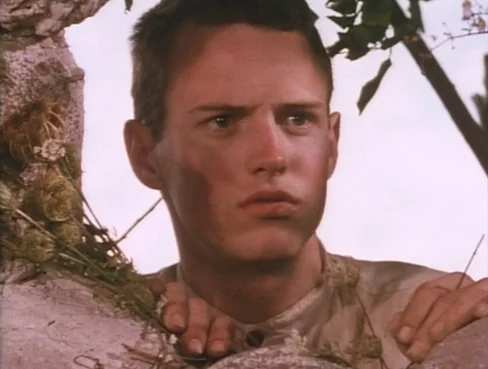🎯 Quick Overview
Trailer
- Director: Todd Haynes
- Genre: Drama, Horror, Sci-Fi
- Release year: 1991
- Runtime (length): 1h 25min
- IMDb rating: 6.3/10 (5.2K votes)
- Rotten Tomatoes: 80%
😅 Plot Summary – Badly Explained
A kid kills his dad and flies away, a scientist drinks sexy leper juice, and two guys get intimate in prison, all mixed together because art.
🍿 Poison: Detailed Plot Synopsis
An Anthology of Outsiders
Todd Haynes’ debut feature “Poison” is structured as a triptych, weaving together three distinct stories inspired by the works of French writer Jean Genet. These narratives are presented out of chronological order and intercut throughout the film, exploring themes of alienation, desire, violence, and societal fear. Each segment employs a unique cinematic style.
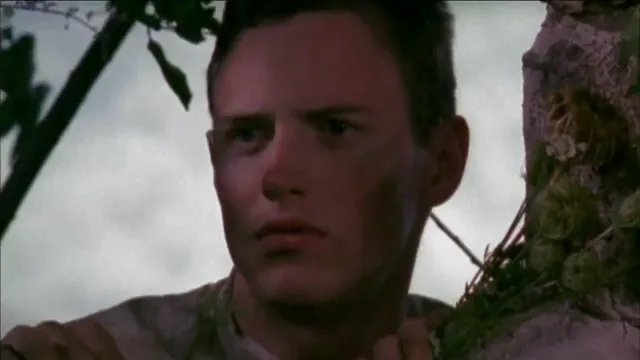
Story 1: Hero
Presented as a lurid, low-budget documentary, ‘Hero’ investigates the bizarre case of seven-year-old Richie Beacon. Following the fatal shooting of his abusive father, witnesses recount Richie’s strange behavior and his subsequent disappearance. His mother claims he simply flew out the window.
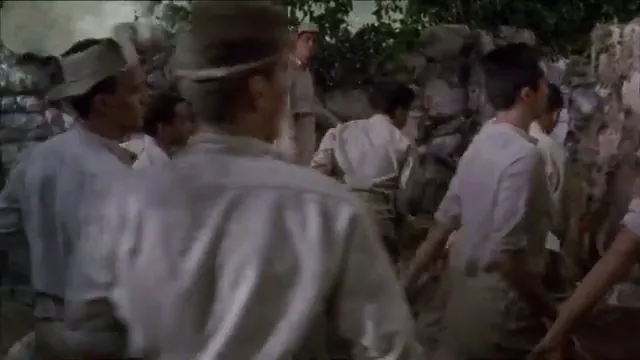
Story 2: Horror
Shot in black and white, ‘Horror’ is a pastiche of 1950s B-movie science fiction. Dr. Thomas Graves, a scientist, accidentally ingests a serum he created, which is the extracted essence of human sexuality. The ingestion causes him to become a grotesque, infectious leper-like figure, spreading his condition through physical contact.
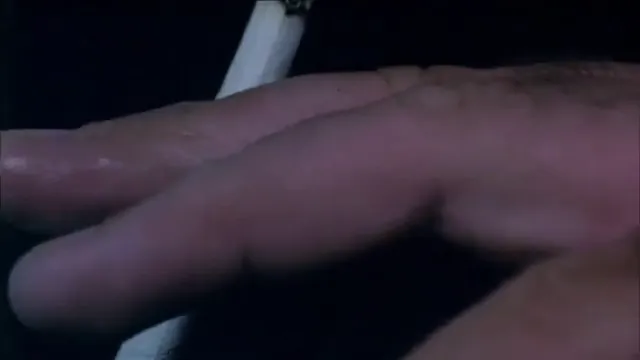
Story 3: Homo
Filmed in dim, atmospheric lighting with bright flashbacks, ‘Homo’ follows John Broom, an inmate in Fontenal prison. He becomes drawn to a new prisoner, Jack Bolton, whom he recognizes from their shared past in a juvenile institution. The story delves into themes of desire, power dynamics, and traumatic memories within the confines of the prison.
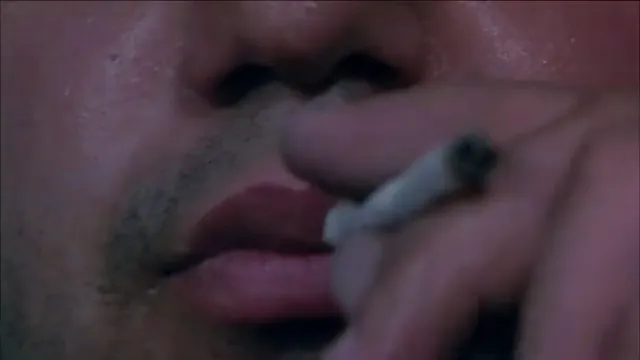
⚠️ Spoilers and Ending Explained
🎬 Cast & Characters
- Richie Beacon (Scott Goetz): The young boy from the “Hero” segment who becomes notorious after shooting his abusive father.
- Dr. Graves (Larry Maxwell): The scientist in the “Horror” segment who becomes a contagious monster after accidentally ingesting a potent serum.
- John Broom (Craig Chester): The man from the “Homo” segment who is imprisoned and develops a passionate relationship with a fellow inmate.
- Ras (James Lyons): The charismatic fellow inmate in the “Homo” segment with whom John Broom falls deeply in love.
- Fenton White (Edith Meeks): A key figure in the “Hero” segment who offers commentary on Richie Beacon’s case, representing the community’s bewildered perspective.
💬 Memorable Quotes
- Dr. Graves: “Felis catus… has nine lives. But this… is too much.” – Said by the scientist in the ‘Horror’ segment after witnessing the strange effects of the experimental substance on a test subject.
- Narrator: “He just flew right out the window.” – A frequently repeated line in the ‘Hero’ segment, highlighting the surreal and unexplained nature of Richie’s escape after shooting his father.
- Julian Goade: “I need… I need to know what desire is.” – Spoken by Julian in the ‘Homo’ segment, expressing his deep yearning for connection and understanding in the harsh environment of prison.
- Dr. Leiden: “The substance… the substance was myself!” – A climactic line in the ‘Horror’ segment where the doctor realizes the horrifying truth about the infectious substance.
💰Box Office
- Budget: $250,000 (estimated)
- Domestic Gross: $787,280
- Worldwide Gross: $787,280
💥 Poison Reviews
Personal Review
Okay, wow. This movie is definitely *not* what I expected, in the best and worst ways. I went into it knowing it was experimental, but the way it jumps between the three totally different stories was jarring at first. The ‘Hero’ mockumentary bit with the flying kid was just bizarre and stuck with me, especially the creepy interviews. The ‘Horror’ part felt like watching a really weird, low-budget 50s sci-fi flick, all black and white and dramatic narration, but with this underlying sickness that felt really heavy. The ‘Homo’ prison story was probably the most emotionally intense, even if the lighting made it hard to see sometimes. It was dark and uncomfortable but felt very real. Overall, I wouldn’t say I ‘enjoyed’ it in a typical way, but it absolutely made me think. It’s disturbing and beautiful and confusing all at once. It’s the kind of film you argue about with friends afterward.
- Who would enjoy:
- “Fans of Todd Haynes’ other films”
- “Viewers interested in experimental or art-house cinema”
- “Students of film studies, particularly queer cinema or anthology films”
- “Those intrigued by challenging, non-linear narratives”
- “People interested in films inspired by literary figures like Jean Genet”
- Content warnings ⚠:
- “Explicit homosexual content and themes”
- “Violence and disturbing imagery”
- “Themes of sexual abuse (implied/flashback)”
- “Body horror and grotesque transformations”
- “Potentially unsettling content due to themes of disease, alienation, and societal fear”
Professional Reviews
- Film Critic: “Todd Haynes’ debut is a challenging triptych that pushes boundaries with its bold style and subject matter. Weaving three disparate narratives – a mockumentary on patricide, a B-movie horror exploring contagion, and a stark prison drama – the film deliberately disorients but rewards patient viewers. Its experimental structure, inspired by Jean Genet, dissects themes of alienation, desire, and societal repression through distinct visual languages. While occasionally uneven, it showcases a director unafraid to confront uncomfortable truths.
- Film Critic: “”Poison” is a visceral, thought-provoking experience that masterfully blends genres and tones. The film’s strength lies in its distinct segments – the eerie realism of “Hero,” the campy horror of “Horror” (with a clear allegorical resonance), and the raw intensity of “Homo.” Haynes utilizes cinematic techniques brilliantly in each, creating unsettling atmospheres and exploring complex emotional landscapes. It’s a significant work in independent cinema, even if its fragmented nature proves alienating for some.
Audience Reactions
Many were fascinated by the film’s bizarre, fragmented storytelling style.: Viewers often praised the film’s artistic ambition and unique visual approach across its three segments, noting its provocative themes.
The intense and emotionally raw ‘Homo’ segment resonated deeply with some viewers.: The film is frequently cited for its significance in New Queer Cinema and its unflinching portrayal of complex relationships and societal pressures.
Others found the film confusing, boring, or unnecessarily graphic and pretentious.: A common point of criticism was the film’s perceived lack of coherence, slow pacing, and discomforting imagery, making it difficult to watch or connect with.
Overall Consensus: Highly divisive and challenging, ‘Poison’ is celebrated by some for its groundbreaking experimental style and thematic depth, while others found it inaccessible, disjointed, and off-putting.
Awards
- Sundance Film Festival (Grand Jury Prize – Dramatic)- 1991
🛠️ Behind the Scenes
- “Poison was director Todd Haynes’ feature directorial debut, expanding on themes explored in his controversial short film “Superstar: The Karen Carpenter Story”.”
- “The film’s structure is a triptych inspired by the writings of French author Jean Genet, particularly his works exploring crime, sexuality, and transgression.”
- “Despite winning the Grand Jury Prize at the Sundance Film Festival, the film faced significant controversy and protests upon release, particularly from conservative groups, due to its explicit exploration of queer themes and graphic imagery.”
- “The ‘Horror’ segment utilized low-budget, B-movie aesthetics and practical effects as a deliberate stylistic choice to evoke classic sci-fi horror films.”
- “Much of the film was made with grant money and independent financing, reflecting the burgeoning New Queer Cinema movement of the time.”
🖥️ How to Watch Poison?
Finding ‘Poison’ (1991) may require checking specialized streaming services for classic or independent films, as availability fluctuates. It is often available for digital rental or purchase on platforms like Apple TV, Amazon Prime Video, and other VOD providers. Check these services for the most current viewing options.

🎥 Similar Movies
If you enjoyed Poison, you might like these similar films:
- Querelle (1982): Like ‘Poison’, this film is based on a work by Jean Genet and explores themes of crime, desire, and male sexuality in a stylized, non-realistic way.
- Paris Is Burning (1990): A landmark documentary from the same era, it explores queer identity, community, and performance in New York City, representing the context of the New Queer Cinema movement ‘Poison’ is part of.
- Short Cuts (1993): This Robert Altman film also uses a mosaic or anthology structure, though with interconnected narratives, presenting a fragmented view of life, similar to ‘Poison’s’ triptych approach.
- Pink Flamingos (1972): A quintessential cult classic known for its transgressive themes, graphic content, and challenge to societal norms, much like ‘Poison’ was controversial in its time.
- The Babadook (2014): While different in genre, this film explores complex psychological horror linked to trauma and internal states manifesting externally, echoing the ‘Horror’ segment’s themes of fear and the body.
🛒 Poison Related Products
- Poison [Blu-ray]: Own the restored version of Todd Haynes’ controversial and groundbreaking debut film, a triptych of experimental narratives.
- The Genet Collection: Our Lady of the Flowers, The Miracle of the Rose, The Thief’s Journal: Experience the foundational literary works by Jean Genet that inspired Todd Haynes’ ‘Poison,’ exploring themes of criminality, sexuality, and rebellion.
- Todd Haynes: Interviews (Conversations with Filmmakers Series): A collection of interviews with director Todd Haynes discussing his filmography, including his early work on ‘Poison,’ offering insights into his creative process and themes.
- New Queer Cinema: The Director’s Cut: An essential guide to the wave of independent films from the early 1990s that redefined queer representation, providing context for ‘Poison’s’ place within this movement.
🎧 Soundtrack
Poison features a captivating soundtrack that enhances the movie’s atmosphere and emotional impact. Here are some notable tracks:
You can find the complete soundtrack on Amazon Music and Apple Music.
🤨 FAQ
Todd Haynes’ film ‘Poison’ is divided into three intercut segments: ‘Hero,’ a mockumentary about a boy who shoots his father and flies away; ‘Horror,’ a 1950s-style B-movie about a scientist who becomes a contagious leper; and ‘Homo,’ a prison drama focusing on a relationship between two inmates.
‘Poison’ gained controversy due to its explicit homosexual themes and content, particularly the ‘Homo’ segment. It also received a completion grant from the National Endowment for the Arts (NEA), leading to significant political backlash and public debate from figures like Senator Jesse Helms, who criticized the use of taxpayer money for the film.
Yes, ‘Poison’ won the Grand Jury Prize at the 1991 Sundance Film Festival. This award significantly boosted its profile and helped it gain wider distribution on the art-house circuit despite its controversial nature.
Poison explores various complex themes across its three stories, including alienation, societal rejection, the nature of sexuality and desire (particularly homosexuality), violence, trauma, contagion (often interpreted as an allegory for the AIDS epidemic), and the relationship between outsiders and the world around them.
One segment of ‘Poison,’ titled ‘Horror,’ is a pastiche of 1950s science fiction horror films. However, the movie as a whole is a drama anthology that incorporates elements of mockumentary, science fiction, and prison drama. It’s best described as an experimental art-house film rather than a straightforward horror film.
🔥 Bonus Content
Poison – Nothin’ But A Good Time
Want to watch the legendary music video from the band Poison? This track is a total classic and has racked up millions of views – check it out for some pure rock energy!
Poseidon (1/10) Movie CLIP – Capsized (2006) HD
Curious about intense disaster movie scenes? This clip showing a ship capsizing from ‘Poseidon’ is pretty dramatic, even though it’s from a different film, it really puts you on edge!
Whose cup is the poison in?#movie #foryou #fyp
Heard of that famous ‘poison in the cup’ movie scenario? Here’s a super popular short clip that captures that classic suspenseful moment – it’s short, sweet, and highly liked!
✨ Rate
There are no reviews yet. Be the first one to write one.


